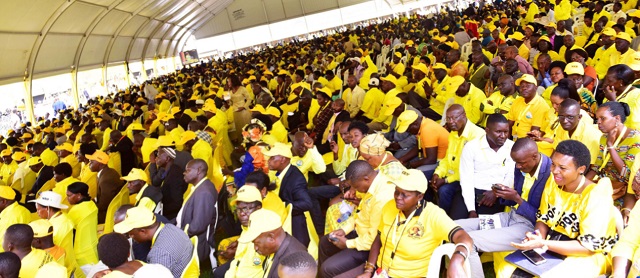
NRM set to take Shs12 bn of released Shs15 bn
Kampala, Uganda | MUBATSI ASINJA HABATI | After two years of waiting the Government of Uganda has finally released Shs15 billion to the Electoral Commission for funding political parties. The money goes political parties with representation in parliament parties. They were expecting at least Shs30 billion.
The release of this money comes after the Speaker of Parliament, Rebecca Kadaga summoned the Minister of Finance, Planning and Economic Development, Matia Kasaija, to explain the delayed release of the funds to political parties represented in parliament yet the House was each year passing a budget for the same.
“We appropriate the money and we would like to know why the money has not been released. The Minister of Finance should update this House after the Independence week,” Kadaga said. Before the minister would give the explanation, he quickly released Shs15 billion.
Parliament has every year been appropriating Shs10 billion to be shared by all political parties who have representation in parliament. Initially the law stipulated that the money is shared depending on numerical strength.
Going by numbers NRM which has over 293 legislators in the 10th parliament would take 84% of the Shs15 billion released or Shs12 billion. It would be followed by FDC which has 36 MPs would get 10% or Shs1.5 billion, DP with 15 would get 4% or Shs600 million, then UPC which has 6 MPs would get 2% or approximately Shs300 million and lastly JEEMA which has a lone MP would get Shs150 million .
But a pulling of ropes has emerged over the sharing formula and the Electoral Commission Chairman, Simon Byabakama, says talks are underway to agree on the modalities of sharing the Shs15 billion among political parties.
In May 2019 members of the Inter-Party Organization for Dialogue – IPOD Summit resolved that funding to Political Parties with representation in Parliament be increased from the current 10 billion to Shs35 billion in the financial year 2019/2020.
The formula IPOD adopted for sharing the funds was that at least 15% of the funding from the government be allocated to the IPOD secretariat to intensify the quest for dialogue amongst political players in the country. Then 40% of the remaining funds would go to the office of the Leader of Opposition and 60% be shared based on the numerical strength of each of the political parties represented in parliament.
The release of Shs15 billion shows that this resolution is yet to be implemented.
Asuman Basalirwa the chairperson of Inter-Party Organisations Dialogue (IPOD) and JEEMA party president argues the money should be shared equally among political parties since it has been released during an election season.
The NRM party, which is poised to take the lion’s share of this money, has opposed the proposal to share the money equally.
“It would be unfair to shift goal posts now, since previously we have agreed that this money should be shared based on numbers each party has in parliament,” Emmanuel Dombo, the NRM spokesman, said.
And Muhammed Muwanga Kivumbi, a Member of Parliament on DP ticket has even more radical proposals. He wants political party leaders who get the money to involve party members in deciding how it is used.
“Whoever receives the money can spend it the way they want. There is no requirement to seek the approval of the delegates’ conference or the party council,” says Kivumbi, who recently crossed to the National Unity Platform.
He adds that poor political parties cannot do meaningful political governance.
“Our finding was that parties are poor and when you are poor, you cannot do politics. The current financing system is not fair because it considers numerical strength in parliament, so for a party like DP that only has 15 members in the House, we walk away with peanuts,” Kivumbi says.
He said a different formula should be used to calculate the amount of funding parties receive; especially because current mechanisms are inadequate.
 The Independent Uganda: You get the Truth we Pay the Price
The Independent Uganda: You get the Truth we Pay the Price



